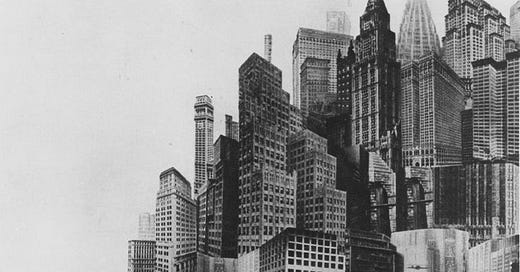Some places are dead. I don’t mean like a cemetery. There’s a difference between being dead and containing death. Anyone who’s been in a graveyard knows how much vitality there is in deer and trees and bodies returning to the earth. There’s more of life in those borderlands than in the leaden monstrosities I’m talking about.
In these machines, everything is glass and metal and epoxy. Wood forgets it was a tree. Plastic pretends to be wood. Flat, black stones that have never touched a river or heard the sound of water fill decorative bowls and boxes, caskets that were designed to suggest the idea of a garden but have never held a root or an inch of dirt. Angles, bars, and rods are the joints and ribs in these corpses that imitate without understanding. The sunlight is diffused. The only connection runs between you and a million mobile obligations.
Stopping in a metropolis
Recently, on a business trip, my husband and I stayed in a hotel like that. The city we visited was huge and congested, though not without beauty—food, old buildings, gardens, museums. And surrounding it, water and the mountains.
Our accommodation, however, was right in the thick of the city—a domineering, geometric building of seventeen or eighteen floors. I got to see quite a lot of it while I was there. During the days while my husband was at work, I would leave our room for the benefit of the cleaning staff and work on my writing in the lobby.
The other guests were not the sort of people I encounter in my everyday life, and I took an interest in watching them. They were wealthy business people and professionals, almost stereotypes. No one stepped out of their room without looking completely put together. Expensive suits, tailored coats, beautiful shoes. Even when they exercised, hair was done and joggers were name brand. They all had a haggard, focused, switched-off look that made me feel, even when we were inhabiting the same elevator, that we were existing on different planets.
Everywhere around me there were Zoom meetings. Talk of growth, investment, and organization. Nothing personal. No family. No recreation. This wasn’t the sort of locale. The hotel, for all its iron pomp, didn’t even have a pool, and in the many hours I spent sitting there I only ever saw two children and one small, spiritless dog.
All that to say, I got the impression that my fellow guests were, at least in that setting, uncomfortable being human.
I don’t mean that as a judgement. By the end of the first day, resentment of the high school sort for my hair, my body, my clothes, and my lack of a PhD was needling me. I was beginning to feel my life in consumerist material terms, as a machine might figure values.
I’m far too impressionable. But I believe if you can become conscious of a thing, you can manage it. Just as when I realized my YouTube use was unhealthy, it was my inability to create that woke me from my hypnosis.
I couldn’t write in that lobby. I couldn’t read. And I wanted to.
Seeking respite
A change of scenery, however slight, was needed. I was recovering from a cold, so I decided, on our second-to-last day in town, to wake up early enough to do my work in our hotel room. The first thing I did was open the curtains as wide as they would go and let the sunlight in. There was a beautiful view of the shoreline, and even without opening the window, I could hear the waves rushing and churning. Without intending to, we’d made our lodging homey by mildly over packing and keeping it only half-neat. Our clothes filled the closet and the drawers. Toothbrushes were just where we kept them at home. My two journals and my copy of The Silmarillion were tucked into the shelf on my bedside table under a bottle of holy water and a bracelet of prayer beads. Tea and coffee cups sat on surfaces, half drunk. The bed was plush and unmade.
I did some hours of quality work in that room.
Wondering and wandering
I’ve had time to reflect on this experience, and I’ve come to a few conclusions.
I was under the impression, before visiting this hotel, that I could write anywhere, not because experience had proven it, but because I’d never known otherwise. Schedule, sickness, grief, depression had stopped me, but never location.
Old-houses-turned-coffee-shops, libraries, back porches, forest trails, cozy hollows holding flowers, books, fireplaces, soft chairs, wood plank floors, and punched tin ceilings—these are where I’m drawn to create. In such a natural way that I never questioned it.
I was fortunate when we moved into our current home to have room for a study. Through my window, I can see sky and forest, and the tree just outside blooms white-pink every spring. Visiting birds and their songs, sung on those branches, are a blessed distraction.
In creation, and in the true memory of creation, I can be human. In a machine, I can only be a machine.
That’s what I meant when I said some places are dead. Nothing is dead like a machine, and they have a tendency to make any living thing they touch more like themselves.
Avoid these machine structures, if you can. It’s harder than it used to be. And if you’re unsure as to whether or not you’re in one, ask yourself if the world has gotten larger or smaller since you arrived.





This resonated so much with me. I've long felt greatly impacted, creatively and emotionally, by my surroundings and you put it into perfect terms by describing these places as "dead." This is the main reason my husband and I hope to move out to the country one day and get out of a sad-looking ugly city area.